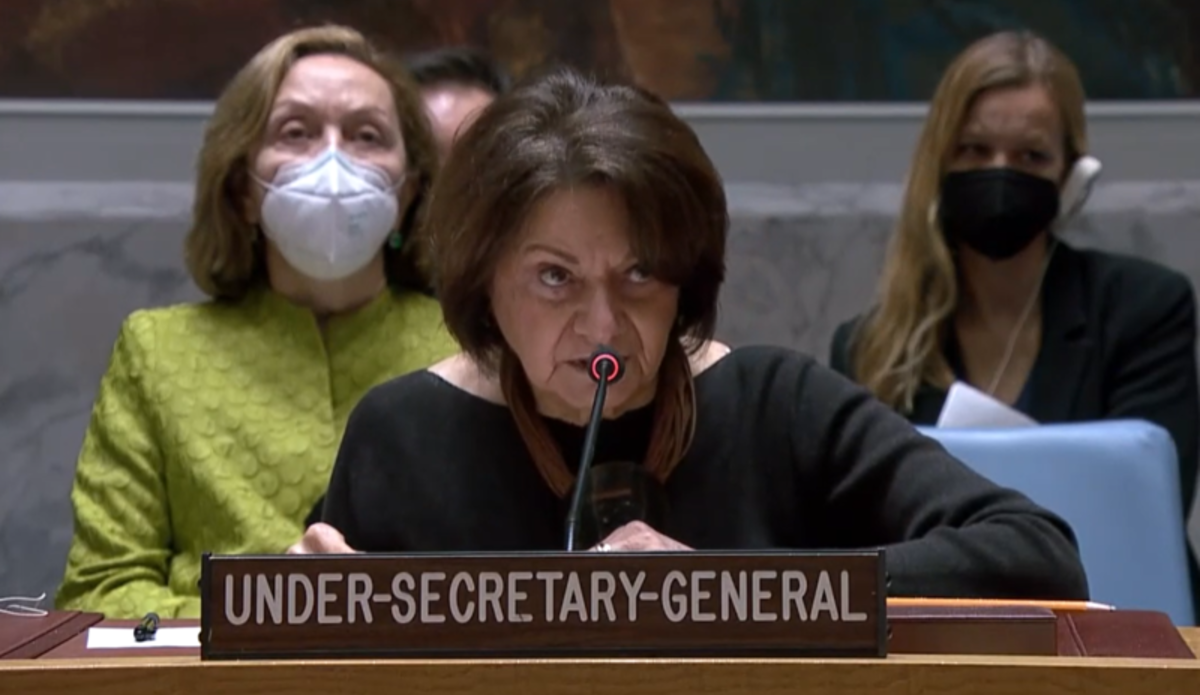Mister President,
Thank you for the invitation to join His Excellency, Foreign Minister Rau, Chairperson-in-Office of the Organization for Security and Cooperation in Europe (OSCE), to brief the Council on UN-OSCE cooperation.
The tragic conflict in Ukraine, which over the weekend has further worsened, vividly illustrates the importance of mechanisms to maintain and strengthen European and international peace and security.
Born out of the Cold War, the OSCE, has been at the center of efforts to bring its unique membership, spanning from Vancouver to Vladivostok, around one overarching goal: to resolve differences peacefully.
In line with Chapter VIII of the United Nations Charter, the OSCE works in complement to the UN, including to resolve conflicts in the region.
In 1993, the UN and the OSCE established a Cooperation Framework. Since then, our partnership has grown in scope and substance to help address acute crises and find solutions to common peace and security challenges.
Our shared commitment to preventive diplomacy, mediation, peacebuilding, and the Women, Peace and Security agenda, was reaffirmed through the Joint Declaration between the Secretary-General and the Chairperson-in-Office in 2019.
The coordination and complementarity guiding our efforts translate into action in various ways.
We work together in Central Asia, most recently to implement the UN Global Counter-Terrorism Strategy.
In the Western Balkans, to advance reconciliation.
And in the Caucasus, where the UN co-chairs the Geneva International Discussions on Georgia along with the OSCE and the EU.
Further, the UN has sought to complement the OSCE’s leading role to address protracted conflicts regarding the Nagorno-Karabakh and Moldova.
Regarding Ukraine, and pursuant to Security Council resolution 2202 on the Minsk Agreements, the UN has consistently supported the work of the OSCE, especially the Special Monitoring Mission and the OSCE-led Trilateral Contact Group, while carrying out our humanitarian and human rights mandates on the ground.
I wish to pay tribute here to all OSCE staff for their important work accomplished under very challenging circumstances.
Mister President,
The war in Ukraine is the most severe test the OSCE and related regional frameworks have faced since their creation. The Russian invasion has shaken the foundations of the European security architecture to its core.
As we meet, the bloodshed continues to worsen. Russian forces have now launched deadly strikes in the west of Ukraine.
Ukrainian cities are under unrelenting shelling and bombardment, with many civilians killed daily.
As I said three days ago in this very chamber, the Office of the High Commissioner for Human Rights (OHCHR) has received credible reports of Russian forces using cluster munitions, including in populated areas. Indiscriminate attacks, including those using cluster munitions, which are of a nature to strike military objectives and civilians or civilian objects without distinction, are prohibited under international humanitarian law.
We are deeply disturbed by reports that Ukrainian municipal officials in Russian-controlled parts of the country have been abducted. There are also reports of civilians, including journalists, being targeted, allegedly by Russian forces.
Mister President,
We must not allow any questioning of the sovereignty and territorial integrity of Ukraine within its internationally recognized borders. Such questioning would be inconsistent with the United Nations Charter and relevant Security Council and General Assembly resolutions.
Amid these dire conditions, the United Nations continues to scale up not only its humanitarian support to the people of Ukraine, but also its engagement with key partners like the OSCE in support of an immediate ceasefire and a lasting diplomatic solution.
When the Secretary-General addressed this Council on the topic of “Conflicts in Europe” in 2017, he warned that, despite the achievements of the last 70 years, we should not take peace and prosperity in Europe for granted.
He cautioned that as serious conflicts persisted in Europe, new threats and risks made it even more pressing for multilateral institutions and regional organizations to address dangerous challenges to the international order.
The Secretary-General’s warnings then were informed in large part by the crises in Georgia in 2008 and in Ukraine in 2014, which demonstrated how real the risks of new outbreaks of conflict were.
Today, a devastating war is being waged in a continent that should be equipped to prevent such catastrophes.
We are concerned at the dismantling of longstanding confidence-building measures, arms control treaties and other frameworks that were designed and agreed to sustain regional security.
This includes the persistent use of regional mediation mechanisms as tools not to solve conflicts, but to manage them, which only helps ensure that those same conflicts continue.
OSCE-led processes supported by the international community are now openly questioned by parties involved in them.
Mister President,
It is more important than ever for all parties to recommit to the principles of the Helsinki Final Act, the Charter of Paris and other landmark agreements that form the bedrock of European security architecture.
In this context, we take good note of the efforts by the Polish Chairperson-in-Office under Minister Rau’s leadership to initiate a “Renewed OSCE European Security Dialogue”.
How the OSCE and other regional actors choose to secure the future of European security cooperation will have an impact beyond Europe.
The UN supports all efforts to restore mutual trust and respect among regional stakeholders, which is essential to preserving the continent from new conflict and the world from further instability.
We, therefore, all have a stake in the outcome.
Mister President,
For almost 50 years, the United Nations and the OSCE have partnered to promote European peace and stability. The challenges we face today, and those potentially ahead, demand that we work even more closely together.
Thank you.

